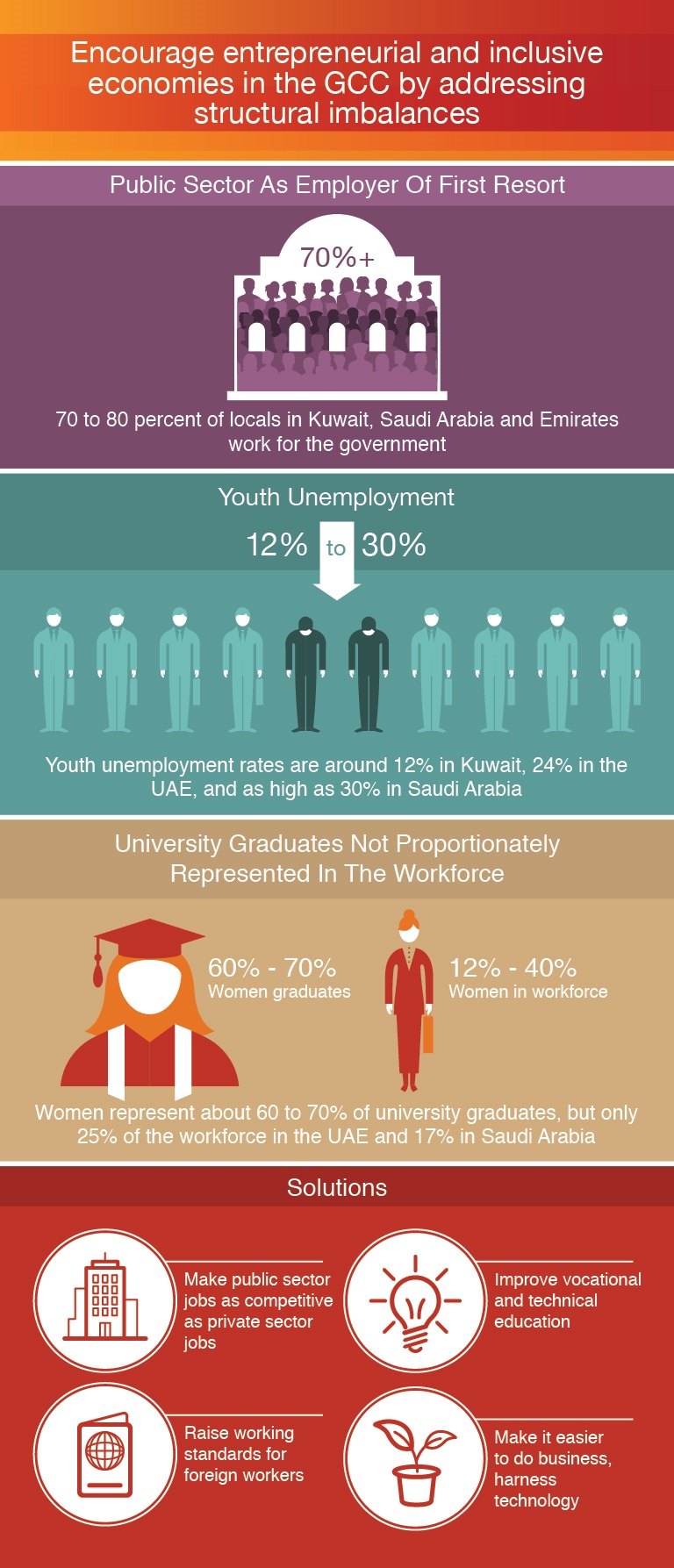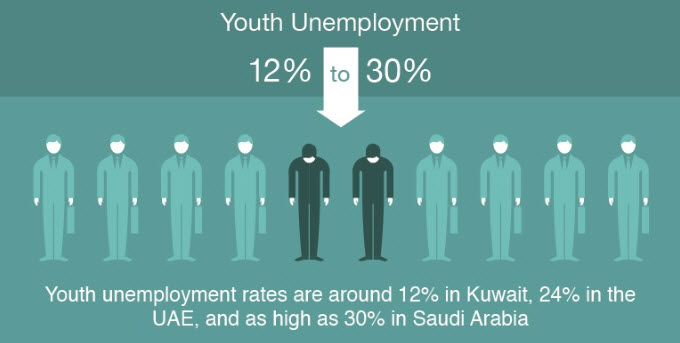Gulf economies are taking bets on the future, spending billions on new airports, bigger ports and more extensive transport networks in order to continue to fuel economic growth. Yet these investments are meaningless in the long-term unless we can develop local manpower – and womanpower – to manage this growth.
There are three serious structural problems in labour markets in Gulf Cooperation Council countries (Bahrain, Kuwait, Oman, Qatar, Saudi Arabia and the United Arab Emirates) that need to be addressed urgently:
The first is a public sector share of the economy that crowds out entrepreneurialism and a thriving private sector. Whereas nine out of ten jobs in most emerging markets come from small and medium enterprises (SMEs), in the GCC, the potential of the SME sector is limited by the relatively large size of the government sector, with the reverse labour incentives and bureaucracy that comes with it. The situation is only getting worse as governments seek to deal with rising unemployment by further increasing the scope and scale of public programs.
The second challenge is high levels of youth unemployment in a region of the world in which more than half the population is under the age of 25. Youth unemployment rates are around 12% in Kuwait, 24% in the UAE and as high as 30% in Saudi Arabia, according to a report from the Gulf Investment Corporation (GIC). At a time of unrest and change in the region, social, economic and political pressure to address this issue is steadily mounting.
The third problem is that the most highly educated members of the population are not making it into the workforce. I am talking about women, of course. The majority of university graduates in the Gulf are women and yet they are not proportionately represented in employment figures.
On the better end of the spectrum are countries like Kuwait and Qatar, where women represent 70% and 60% of university graduates, respectively, and about 42% of the workforce in Kuwait and 36% of the workforce in Qatar. In countries like the UAE and Saudi, however, women represent 70% and 60% of university graduates respectively, but only 25% of the workforce in the UAE and 17% in Saudi. Both the public and private sectors are missing out on some of their most qualified talent.
So what’s the answer? While there is no panacea, here are four ideas for policy-makers and businesses:
1. Make public sector jobs as competitive to get as private sector jobs. We must apply a selective and meritocratic recruiting framework, and offer work hours and wages which are comparable to the private sector. Currently, between 70-80% of Kuwaitis, Saudis and Emiratis work for the government. This is not a phenomenon that is changing fast enough. In fact, recent political unrest tied to the Arab Spring and high unemployment rates have only resulted in even more job creation in the public sector. With relatively high wages, shorter hours and a job virtually guaranteed for life, the incentives for local nationals to join the public sector are minimal. And yet, what economy can truly thrive in the long-term without a vibrant public sector? The culture and practice around government employment needs to undergo massive change, and it needs to happen sooner rather than later while governments still have the means to ease this transition. “Shock therapy” down the line can be avoided if action is taken now.
2. Improve dramatically investment in education, especially in technical topics and vocational training. The question is not one of money – spending on education in the Gulf is the highest in the developing world per capita – it’s one of measurable outcomes. Here, the private sector also has a role: by helping governments reform curriculums by helping identify what practical skills are needed on-the-job, by offering strong and structured apprenticeship or internship programmes (one only needs to look at the German economy to see how powerful on-the-job training can be), and by co-investing in ongoing employee development once people join the private sector.
 3. Reduce the overreliance on foreign workers with artificially low wages. Foreigners represent nearly 70% of the total employed workers in the GCC labour markets, which is counterintuitive when one considers how many local nationals are looking for work. If you look at private sector employment figures, in particular, where the bulk of foreigners work, foreign workers outnumber locals 44:1 in Kuwait, 99: 1 in Qatar, and 9:1 in Saudi Arabia, according to the GIC. The numbers are truly staggering. That said, foreign workers have been a critical part of building the economies of the GCC and any policy measures should reflect this reality. Rather than forcing foreign workers out, my suggestion is the opposite – better regulate this market, enforce fair labour standards more strongly and consider minimum wage policies for certain types of work. The market will correct itself, and our countries will only benefit from a work culture that is fair to all.
3. Reduce the overreliance on foreign workers with artificially low wages. Foreigners represent nearly 70% of the total employed workers in the GCC labour markets, which is counterintuitive when one considers how many local nationals are looking for work. If you look at private sector employment figures, in particular, where the bulk of foreigners work, foreign workers outnumber locals 44:1 in Kuwait, 99: 1 in Qatar, and 9:1 in Saudi Arabia, according to the GIC. The numbers are truly staggering. That said, foreign workers have been a critical part of building the economies of the GCC and any policy measures should reflect this reality. Rather than forcing foreign workers out, my suggestion is the opposite – better regulate this market, enforce fair labour standards more strongly and consider minimum wage policies for certain types of work. The market will correct itself, and our countries will only benefit from a work culture that is fair to all.
(Source: Agility)
4. Make it easier to start and run a business, including online businesses. Good progress has been made on this front in some countries. While countries like the UAE, Saudi and Qatar still trail the front-runners like Singapore and Hong Kong in the World’s Bank “Ease of Doing Business Report”, they are showing improvement, ranking 23rd, 26th and 48th rank, respectively (Kuwait is the outlier, as 104 on the list). That said, the digitalization of commerce offers real opportunities across the board, especially since connectivity in the Gulf is so good. Social media penetration in the Gulf is among the highest in the world, and there is a growing, informal economy of local businesses run entirely from Instagram or other sites. There is an opportunity here – for young people who grow up as “digital natives”, for women who are looking for more flexibility in where and how they work, for consumers looking for goods and services that meet local needs, and for governments as a source of alternative employment, future revenue and economic growth.
I truly believe that the GCC is a region with tremendous potential. It’s at the crossroads of new centres of consumer spending in Asia and Africa; the population is young, educated and plugged in; governments have the funds to invest in job creation, infrastructure and human capital; there is a thirsty private sector looking to grow and flourish; and there is a whole world of online commerce and cross-regional trade beckoning.
Let’s make the most of this potential by utilizing the talents of our most educated graduates and our young people in general, while at the same time ensuring that our countries are associated with competitive, fair, inclusive and good employment practices for all.
